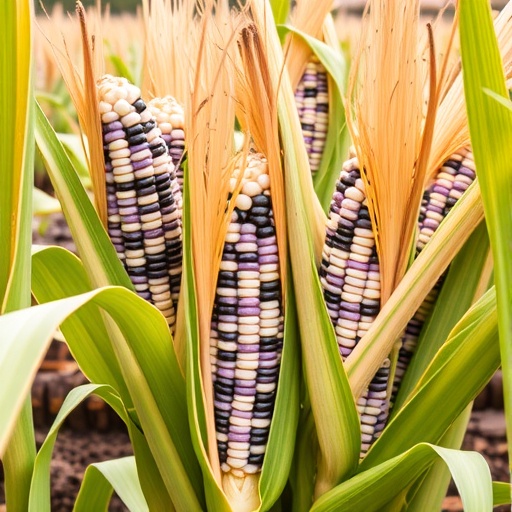In the face of increasing global climate challenges, particularly droughts, scientists are delving deeper into innovative agricultural practices that can enhance crop resilience. A recent study led by researchers Ali, A., Zafar, S., and Mehmood, K. has illuminated a groundbreaking approach to mitigating drought stress in maize plants through silicic acid seed pre-treatment. This technique not only promises to bolster plant growth but also enhances antioxidant responses, fostering a new era of sustainable agriculture.
The looming threat of drought is becoming more pronounced due to climate change, which imposes significant stress on crop yields worldwide. In this context, maize, a staple food for millions, is particularly vulnerable. The researchers’ investigation into silicic acid—a naturally occurring compound known for its beneficial properties—offers a novel pathway to address these challenges. The findings underscore the potential of pre-treating maize seeds with silicic acid to fortify plants against the adversities posed by insufficient water availability.
Silicic acid plays a critical role in plant physiology, impacting various growth and developmental processes. The research team set out to explore how this substance can be harnessed to enhance maize’s performance under drought conditions. By pre-treating seeds with silicic acid, they hypothesized that they could induce physiological changes that would lead to improved growth metrics and enhanced defense mechanisms against oxidative stress.
Throughout the experiment, the researchers meticulously monitored a variety of parameters to assess the impacts of silicic acid on maize growth. Key indicators included germination rates, root and shoot development, and other growth-related attributes. Additionally, they scrutinized how the pre-treatment influenced the plants’ antioxidant systems, which play a crucial role in defending against the harmful effects of drought-induced oxidative stress.
The data collected from this rigorous study revealed significant findings. Maize plants that were pre-treated with silicic acid demonstrated marked improvements in root length and overall biomass compared to untreated controls. This enhancement in root development is particularly vital, as stronger roots enable plants to access moisture and nutrients more effectively, even during periods of drought.
Furthermore, the antioxidant responses of the maize plants were notably elevated following silicic acid treatment. The researchers found that the levels of specific enzymes and compounds associated with antioxidant activity increased significantly. This enhancement suggests that the plants’ ability to mitigate oxidative damage—a common consequence of drought stress—was substantially improved, pointing to the pivotal role silicic acid can play in enhancing plant defense systems.
In addition to physical growth and antioxidant improvements, the study also delved into the biochemical pathways activated by silicic acid. The researchers posited that this treatment may lead to upregulation of stress-protective genes, fortifying the plants’ biological infrastructure against drought. Understanding these underlying mechanisms could pave the way for further advancements in agricultural biotechnology, offering a promising avenue for future research.
An important aspect of the study was its emphasis on practical applications. With a growing global population and an increasing demand for food, innovative solutions are imperative. The adoption of silicic acid treatments could potentially transform how farmers approach crop management in arid regions where water scarcity is prevalent. This method not only boosts productivity but also aligns with sustainable agricultural practices, minimizing the reliance on chemical fertilizers and excessive irrigation.
Moreover, the findings serve as a clarion call for ongoing research into the multifaceted applications of silicic acid in various crops. As scientists continue to explore its benefits, we may see a broader adoption of this pre-treatment technique across different agricultural landscapes, thereby enhancing food security and sustainability on a global scale.
The implications of this research extend beyond just maize. The insights gained from understanding how silicic acid influences drought resilience could be extrapolated to other important cereal crops, such as wheat and rice, which are equally susceptible to climate-induced stressors. Such advancements could revolutionize our agricultural systems, enabling us to produce more resilient crops tailored to withstand the rigors of changing environmental conditions.
Furthermore, the integration of silicic acid treatment into existing farming practices offers a simple yet potent strategy for enhancing crop resilience in the face of adversity. It embodies a shift towards more natural and eco-friendly agricultural interventions that can make a significant impact on food production.
In conclusion, the study on silicic acid seed pre-treatment is a testament to the potential of natural compounds in agriculture. As we grapple with the challenges posed by climate change, innovative approaches like these not only enhance our understanding of plant biology but also provide actionable strategies for improving crop resilience. This research heralds a new chapter for maize cultivation and positions silicic acid as a crucial ally in the quest for sustainable agriculture amid the pressing challenges of drought and food insecurity.
The findings of this study have been published in the journal “Sci Nat,” and emphasize the possibilities that await further exploration in agricultural science. With supportive practices like silicic acid seed pre-treatment, the agricultural sector may find itself better equipped to navigate the turbulent waters of a changing climate.
Subject of Research: Silicic acid seed pre-treatment’s effect on maize growth and antioxidant responses under drought stress.
Article Title: Silicic acid seed pre-treatment modulates growth and antioxidant responses in maize under drought stress.
Article References:
Ali, A., Zafar, S., Mehmood, K. et al. Silicic acid seed pre-treatment modulates growth and antioxidant responses in maize under drought stress. Sci Nat 112, 70 (2025). https://doi.org/10.1007/s00114-025-02021-y
Image Credits: AI Generated
DOI: https://doi.org/10.1007/s00114-025-02021-y
Keywords: Silicic acid, maize, drought stress, antioxidant responses, crop resilience, sustainable agriculture, climate change.




